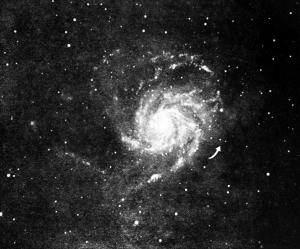 Could the Universe be conscious? This might seem like one of those Interesting Questions To Which The Answer Is ‘No’ that so often provide arresting headlines in the popular press. Since the Universe contains everything, what would it be conscious of? What would it think about? Thinking about itself – thinking about any real thing – would be bizarre, analogous to us thinking about the activity of the neurons that were doing the thinking. But I suppose it could think about imaginary stuff. Perhaps even the cosmos can dream; perhaps it thinks it’s Cleopatra or Napoleon.
Could the Universe be conscious? This might seem like one of those Interesting Questions To Which The Answer Is ‘No’ that so often provide arresting headlines in the popular press. Since the Universe contains everything, what would it be conscious of? What would it think about? Thinking about itself – thinking about any real thing – would be bizarre, analogous to us thinking about the activity of the neurons that were doing the thinking. But I suppose it could think about imaginary stuff. Perhaps even the cosmos can dream; perhaps it thinks it’s Cleopatra or Napoleon.
Actually, so far as I can see no-one is actually suggesting the Universe as a whole, as an entity, is conscious. Instead this highly original paper by Gregory L. Matloff starts with panpsychism, a belief that there is some sort of universal field of proto-consciousness permeating the cosmos. That is a not unpopular outlook these days. What’s startling is Matloff’s suggestion that some stars might be able to do roughly what our brains are supposed by panpsychists to do; recruit the field and use it to generate their own consciousness, exerting some degree of voluntary control over their own movements.
He relies for evidence on a phenomenon called Parenago’s discontinuity; cooler, less massive stars seem to circle the galaxy a bit faster than the others. Dismissing a couple of rival explanations, he suggests that these cooler stars might be the ones capable of hosting consciousness, and might be capable of shooting jets from their interior in a consistent direction so as to exert an influence over their own motion. This might be a testable hypothesis, bringing panpsychism in from the debatable realms of philosophy to the rigorous science of astrophysics (unkind people might suggest that the latter field is actually about as speculative as the former; I couldn’t possibly comment).
In discussing panpsychism it is good to draw a distinction between types of consciousness. There is a certain practical decision-making capacity in human consciousness that is relatively well rooted in science in several ways. We can see roughly how it emerged from biological evolution and why it is useful, and we have at least some idea of how neurons might do it, together with a lot of evidence that in fact, they do do it. Then there is the much mistier business of subjective experience, what being conscious is actually like. We know little about that and it raises severe problems. I think it would be true to claim that most panpsychists think the kind of awareness that suffuses the world is of the latter kind; it is a dim general awareness, not a capacity to make snappy decisions. It is, in my view, one of the big disadvantages of panpsychism that it does not help much with explaining the practical, working kind of consciousness and in fact arguably leaves us with more to account for than we had on our plate to start with.
Anyway, if Matloff’s theory is to be plausible, he needs to explain how stars could possibly build the decision-making kind of consciousness, and how the universal field would help. To his credit he recognises this – stars surely don’t have neurons – and offers at least some hints about how it might work. If I’ve got it right, the suggestion is that the universal field of consciousness might be identified with vacuum fluctuation pressures, which on the one hand might influence the molecules present in regions of the cooler stars under consideration, and on the other have effects within neurons more or less on Penrose/Hameroff lines. This is at best an outline, and raises immediate and difficult questions; why would vacuum fluctuation have anything to do with subjective experience? If a bunch of molecules in cool suns is enough for conscious volition, why doesn’t the sea have a mind of its own? And so on. For me the deadliest questions are the simplest. If cool stars have conscious control of their movements, why are they all using it the same way – to speed up their circulation a bit? You’d think if they were conscious they would be steering around in different ways according to their own choices. Then again, why would they choose to do anything? As animals we need consciousness to help us pursue food, shelter, reproduction, and so on. Why would stars care which way they went?
I want to be fair to Matloff, because we shouldn’t mock ideas merely for being unconventional. But I see one awful possibility looming. His theory somewhat recalls medieval ideas about angels moving the stars in perfect harmony. They acted in a co-ordinated way because although the angels had wills of their own, they subjected them to God’s. Now, why are the cool stars apparently all using their wills in a similarly co-ordinated way? Are they bound together through the vacuum fluctuations; have we finally found out there the physical manifestation of God? Please, please, nobody go in that direction!
